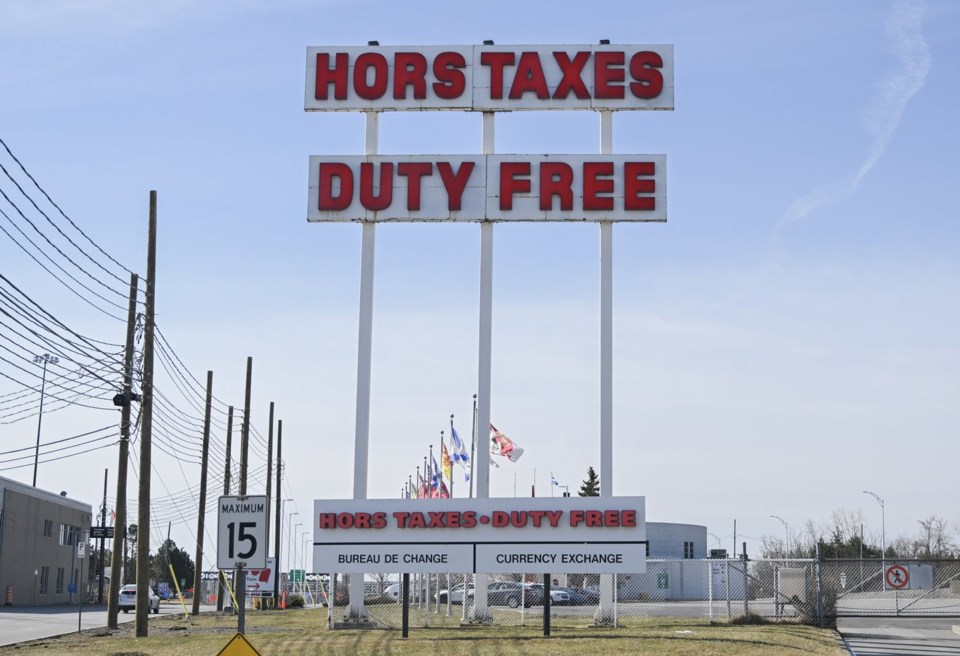MONTREAL — Philippe Bachand was in his mid-20s when he helped open his family’s duty-free store an hour south of Montreal.
In the 37 years since, he has never seen such a drastic drop-off in traffic and sales as the one now playing out, pandemic aside.
After U.S. President Donald Trump set off a continental trade war and mused about annexing Canada, revenue began to plummet in lockstep with shrinking traveller volumes.
“January was not too bad. February was starting to slow down, and then March, with the new tariff and all that, my Canadian traffic was down 50 per cent,” said Bachand, whose shop sits alongside the border in Philipsburg, Que.
“It’s not fun.”
His experience reflects a blow felt by duty-free store owners across the country as Canadian travellers steer clear of the United States amid anger over tariffs, fears about treatment by border guards and Trump's references to Canada as "the 51st state."
Sales at duty-free stores have fallen between 40 and 50 per cent across the country since late January, with some remote crossings reporting declines of up to 80 per cent, according to the Frontier Duty Free Association.
"It just dropped off the cliff," said executive director Barbara Barrett, whose association represents 32 stores.
"It's very grim."
The mom-and-pop shops, which sell products tax-free ranging from maple cookies to Canadian Club whiskey, were only starting to bounce back from COVID-19 when the trade war struck, owners said.
“I just woke up from my COVID hangover, and I’m having a tariff nightmare,” said John Slipp, while driving to the duty-free outlet in Woodstock, N.B., that his father founded in 1985.
While duty-free stores at land crossings number fewer than three dozen, they can be cornerstones of the local economy in rural areas. Bachand's shop employed 50 residents at its height in 2019, and counts 20 on its staff today.
Now, layoffs loom as a possibility if business fails to turn around.
“I have not made them yet, but I’m going to be," Slipp said.
"I've got a new generation coming in. My niece is in now," he continued. "I'd like to have a business for them."
The Frontier Duty Free Association, whose tightly regulated members do not have the option to pivot to delivery or online sales, is calling on all federal parties to adopt support plans in their platforms.
The organization has asked for a relief package for businesses facing immediate harm from trade volatility as well as a ministerial directive to ensure the federal government counts duty-free shops as exporters, a status that would allow them access to loan-based programs rolled out by Ottawa last month.
"You have to exit into the United States. So it's an export-only industry," Barrett stressed. "We are 100 per cent dependent on that travel over the border."
The number of Canadians returning by car from the U.S. fell nearly 32 per cent last month compared to March 2024, the third consecutive month of year-over-year declines and the steepest plunge since the pandemic, according to Statistics Canada.
At some crossings, Americans heading back home make up the bulk of the buyers. But car visits by U.S. residents dropped 11 per cent last month versus a year earlier, the second straight month of year-over-year declines.
"It's like the Americans are shy to come to Canada," said Bachand. He pointed to the boos that American sports teams have endured during their national anthem in Canada over the past two months.
"It's not welcoming."
In Woodstock, Slipp said local shoppers from the American side used to comprise one-fifth of his sales.
“It’s zero now,” he said. "And I believe that’s because of border anxiety. Local Americans are just not sure what’s going on at the border."
Reports of foreigners being sent to detention or processing centres for long stretches of time, including Canadian Jasmine Mooney as well as a pair of German tourists and a backpacker from Wales, have sent shivers north of the border too, chilling some Canadians' urge to go south.
Shop owners said the proportion of Canadian versus American customers traditionally fluctuates based on the two countries' currency. But Canadian visits to the U.S. surged seven per cent in December, when the loonie was also down but the tariff rhetoric had yet to ratchet up.
While booze is their bread and butter, Slipp sought to remind Canadians that duty-free shops sell a range of regional products — in his case, locally made paintings, chocolate and artisanal wooden pens, handcrafted pewter jewelry from Fredericton and maple syrup tapped from nearby orchards.
The White House is where ire might be better aimed, he said, rather than towns and cities across the border where he and countless Canadians have friends and relatives.
Barrett also called for calmer rhetoric across the board, saying "the border is being used as a political football."
“Yes, we’re elbows up. But we’re also open arms.”
This report by The Canadian Press was first published April 11, 2025.
Christopher Reynolds, The Canadian Press


